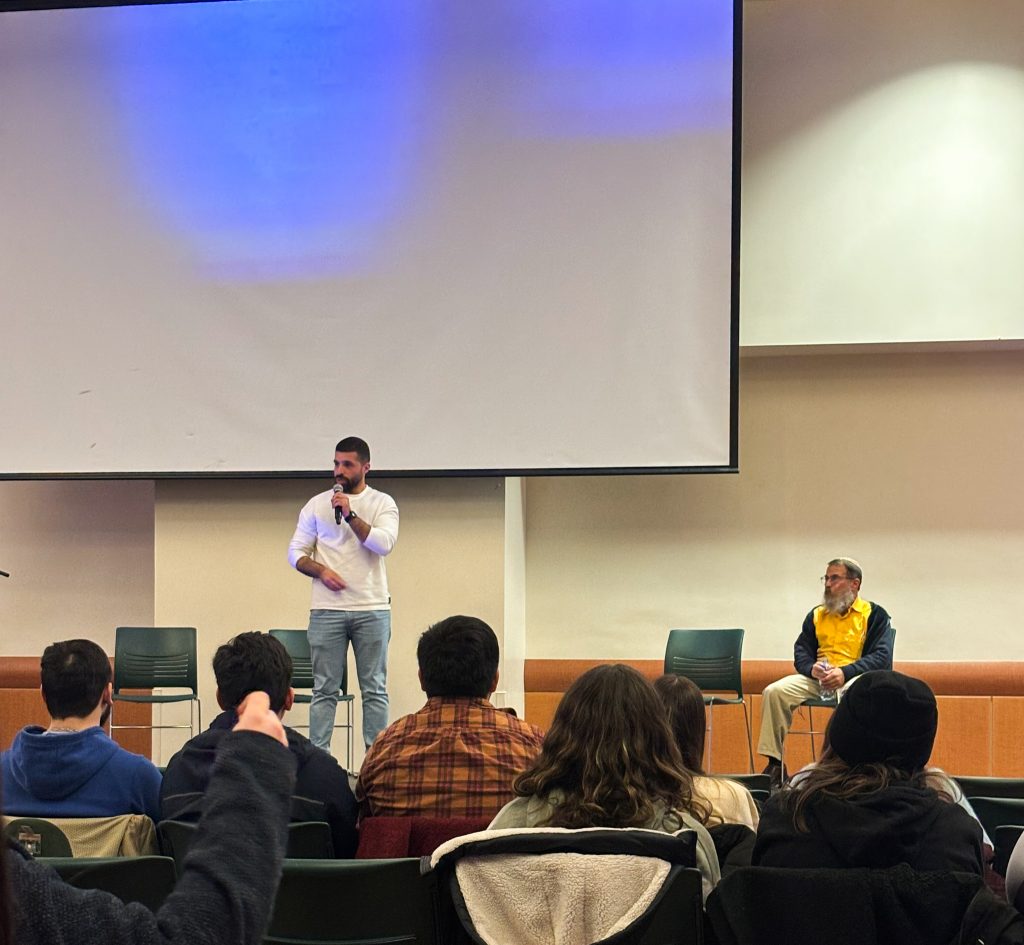On Thursday, Hillel at Binghamton hosted “Two Truths, One Land,” a presentation by Noor A’wad, a Palestinian peace activist, and Orthodox Rabbi Hanan Schlesinger, to explore the complexities of the Israeli-Palestinian conflict and share pathways to mutual understanding.
Held in the Mandela Room, the program was presented by Roots, a “Palestinian-Israeli initiative for understanding, nonviolence and transformation,” in collaboration with Binghamton University’s Interfaith Council, the Judaic Studies Department, Israel on Campus Coalition and the Speech and Debate Team. A’wad and Schlesinger engaged in conversation, exchanging insight into historical context and the potential paths toward peace in the Middle East.
According to Ira Glasser, Hillel’s chief executive officer, the event emphasized the importance of diverse narratives and perspectives.
“We hope that this will provide a model to engage in fruitful, even difficult, dialogue that will help everyone in attendance leave feeling more knowledgeable about, and having a window into the nuances of the conflict from those who are living it,” Glasser wrote in an email. “Roots/Shorashim/Judur works within the heart of the conflict, bringing together Palestinians and Israelis to come face-to-face with both the humanity and the identity of the other side.”
Schlesinger explained that both his background and pervasive segregation in Judea and Samaria — more commonly known as the West Bank — led him to become blind to Palestinian truths, saying “if you mistake part of the truth for the whole truth, that’s pretty close to falsehood and that’s not a place that I want to be,” alluding to his Zionist education and upbringing.
“You have to reconfigure when you think about the past, the present, and the future,” Schlesinger said. “We’re gonna live together, in war or in peace, but we’re gonna live together — gotta get used to that, and that’s really hard. It contradicts the dreams of both sides. And furthermore, we began to see that both sides construct their identities upon the erasure of the other side’s identity. Both sides believe that they can tell the other side who they are.”
He said he felt that the most difficult thing to accept was that the historic boundaries of both Palestine and Israel — “from the river to the sea” — are the same.
Participants were encouraged to reflect on their roles as advocates for humanity. A’wad, who spoke after Schlesinger, expanded on the individual responsibility to take action amid ongoing tensions and to be mindful of others’ perspectives. He said that this will be difficult for some, but listening to the experiences of others can foster peace.
“I will say that what we are trying to do at Roots, […] is that we are not trying to change or erase people’s identities, and we are not trying to just mix everyone in like one identity,” A’wad said. “We do understand that at the end of the day, we have differences — those differences actually make us who we are. But we want our differences in a way that we are accepting each other, not at the expense and by the denial of each other.”
Roots’ work began in 2014, and their peace-building initiatives have included after-school programs, art workshops and summer camps, solidarity visits to victims of violence, open houses, group meetings and interfaith dialogue.
After Schlesinger and A’wad shared their stories, the two participated in a Q&A session. Schlesinger responded to a question about navigating language used by observers and third parties in the ongoing conversation.
“We don’t debate definitions,” Schlesinger said. “We don’t define — we describe to the other who we are, what our identities are and what we experience. I don’t have to put the word Zionism on the board and give it a dictionary definition, [nor] Apartheid or occupation. We get to know each other and hear each other’s experiences.”
Glasser acknowledged that the campus community has experienced division following Hamas’ Oct. 7 attack and Israel’s subsequent military campaign in Gaza, sharing Hillel’s commitment to organizing events that facilitate unity, education and dialogue. The sentiment was shared by Saul Hakim, the president of BU’s Zionist Organization and a junior double-majoring in political science and Judaic studies.
“Tonight’s discussions have been a clear testament to the power of breaking free from our echo chambers,” Hakim said. “They’ve shown us that progress doesn’t come from ignorance but from engagement. […] They’re the building blocks for the future that we want for ourselves and for our children. There’s not an easy way to step into a conversation where you know that you will be uncomfortable, let alone, given the recent global events and the powerful emotions we all feel. The willingness of everyone here to engage, to listen and to contribute stands as a testament to the strength of our community.”
On a program provided by organizers, Roots’ 2019 achievements include engaging 3,350 Palestinian and Israeli youths, 45 volunteers and staff members and 18,000 overseas visitors to its center and attendees to speaking tours.
Mia Raskin ‘23, a first-year graduate student pursuing a master’s degree in business administration, shared the evening’s takeaways.
“The beauty and importance of events like Roots is the value of dialogue and respect that is inherently part of [BU’s] DNA,” Raskin wrote. “The goal was not to leave with the same opinions but to listen, be uncomfortable for two hours and leave with a broader understanding.”



